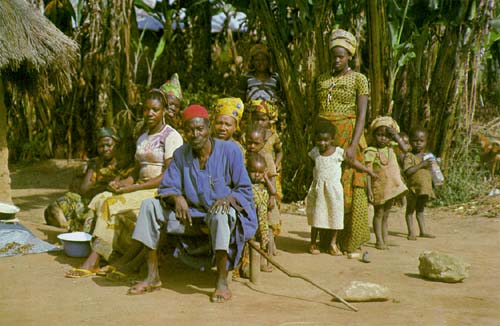
The Yoruba people live in Southwest Nigeria and Benin. They have developed a variety of different artistic forms including pottery, weaving, beadwork, metalwork, and mask making. Most artwork is made to honor the gods and ancestors, and since there are more then 401 known gods to the Yoruba there is a large amount of sculptures and artwork created. Because of the large number of gods, the Yoruba have been compared to the ancient Greeks because of the fact that they both had large amounts of gods, and because there were striking similarities between the structures of the gods.
The Yoruba have started to become quite popular among Africans all over the world who claim the Yoruba as their family roots, and follow the religion and culture of the Yoruba. Many claim that they are part of the Diaspora of the Yoruba slaves.
The Yoruba originated from a people known as the Oyo who arose and became quite popular by their trading with the Portuguese, which gave them a large supply of guns. However, they were unable to push back the Fulani who invaded them and pushed much of the Yoruba to the south. In the late 1800's the Yoruba formed a treaty with the Fulani, and in 1901 the British colonized them. Because of their enmity with the Fulani, who are the great Islam evangelists, most of the Yoruba do not hold to Islam but instead worship many of the gods and spirits that the Yoruba hold to. Economically the Yoruba primarily engage in agriculture, with about 15% of the people employed as merchants or artists and craftsman.
One of the features that make the Yoruba unique is their tendency to form into large city groups instead of small village groups. Most of the large cities of Nigeria and Benin are inhabited almost solely by Yoruba.
View on Motherhood
The Yoruba people have a great respect for motherhood. A woman in Yoruba culture occupies many positions: mother, wife, daughter, priestess, or even a witch. The way she is treated depends largely on her occupation. These different perceptions are reflected through songs, works of art, music, and religion. The highest value is given to a woman who is a mother. The Yoruba people revere motherhood.
A popular proverb among the Yoruba presents motherhood as very precious:
Iya ni wura
Baba ni dingi
Meaning: Mother is gold
Father is a mirror
Even in songs, mother is compared to precious gold:
Iya ni wura iyebiye
Ti a ko le f'owora
O l'oyun mi f'osu mesan
O pon mi f'odun meta
Iya ni wura iyebiye
Ti a ko le f'owora
Mother is a precious gold
That cannot be purchased with money
She carried me in her womb for nine months
She nursed me for three years
Mother is a precious gold
That cannot be purchased with money
The way motherhood is revered in Yoruba culture makes most women look forward to motherhood immensely. By becoming a mother, a woman is promoted to the esteemed position in which she can be referred to as a precious stone. It is wonderful that the Yoruba culture respects motherhood so much, although it has its negatives as well since women who can't have children are often not treated with respect.



This article is free. You can publish or circulate this article on other websites as long as you give credit to Africa Imports; and include a link back to africaimports.com at the end of the article.
 USD
USD  GBP
GBP  CAD
CAD  AUD
AUD 